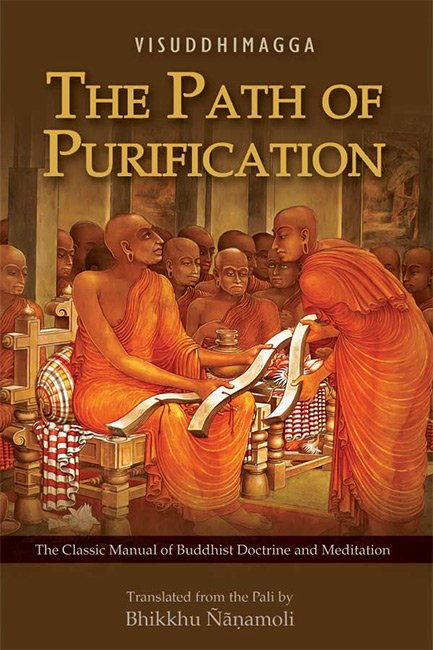Visuddhimagga (the pah of purification)
by Ñāṇamoli Bhikkhu | 1956 | 388,207 words | ISBN-10: 9552400236 | ISBN-13: 9789552400236
This page describes Dependent Origination (viii): Craving of the section Dependent Origination (paññā-bhūmi-niddesa) of Part 3 Understanding (Paññā) of the English translation of the Visuddhimagga (‘the path of purification’) which represents a detailled Buddhist meditation manual, covering all the essential teachings of Buddha as taught in the Pali Tipitaka. It was compiled Buddhaghosa around the 5th Century.
Dependent Origination (viii): Craving
[Full title: B. Exposition of Dependent Origination (III): Detailed Exposition (viii): Craving]
233. As regards the clause “With feeling as condition, craving”:
Six cravings, for things visible
and all the rest, are treated here;
And each of these, when it occurs,
Can in one of three modes appear.
234. Six kinds of craving are shown in the analysis of this clause [in the Vibhaṅga] as “visible-data craving, sound, odour, flavour, tangible-data, and mental-data craving” (Vibh 136), called after their objects, as a son is called after his father “banker’s son,” “brahman’s son.” Each of these six kinds of craving is reckoned threefold according to its mode of occurrence as craving for sense desires, craving for becoming, or craving for non-becoming.
235. When visible-data craving occurs enjoying with sense-desire enjoyment a visible datum as object that has come into the focus of the eye, it is called craving for sense desires. But when [that same visible-data craving] occurs along with the eternity view that assumes that same object to be lasting and eternal, [568] it is called craving for becoming; for it is the greed accompanying the eternity view that is called craving for becoming. When it occurs along with the annihilation view that assumes that same object to break up and be destroyed, it is called craving for non-becoming; for it is the greed accompanying the annihilation view that is called craving for non-becoming. So also in the case of craving for sounds, and so on.
These amount to eighteen kinds of craving. The eighteen with respect to one’s own visible data (one’s own appearance), etc., and eighteen with respect to external [visible data (another’s appearance), etc.,] together make thirty-six kinds. Thirty-six in the past, thirty-six in the future, and thirty-six in the present, make one-hundred-and-eight kinds of craving. When these are reduced again, they should be understood to amount to the six kinds only with visible data, etc., as object; and these, to three only, as craving for sense desires, and so on.
236. Out of selfish affection for feeling after taking pleasure in it when it arises through a visible datum as object, etc., these beings accord much honour to painters, musicians, perfumers, cooks, weavers, distillers of elixirs,[1] physicians, etc., who furnish respectively visible data as object, etc., just as out of affection for a child they reward the child’s nurse after taking pleasure in the child. That is why it should be understood that these three kinds of craving have feeling as their condition.
237.
What is intended here is but
Resultant pleasant feeling; hence
’Tis a condition in one way
For all this craving’s occurrence.
In one way: it is a condition as decisive-support condition only.
238. Or alternatively:
A man in pain for pleasure longs,
And finding pleasure, longs for more;
The peace of equanimity
Is counted pleasure too; thereforeThe Greatest Sage announced the law
“With feeling as condition, craving,”
Since all three feelings thus can be
Conditions for all kinds of craving.Though feeling is condition, still
Without inherent tendency
No craving can arise, and so
From this the perfect saint is free.[2]
This is the detailed explanation of the clause “With feeling as condition, craving.”
Footnotes and references:
[1]:
Rasāyana—“elixir”: not in PED; cf. D-a 568 and Ud-a (commentary to Ud 8.5)
[2]:
“‘Though feeling is condition’ is said in order to prevent a generalization from the preceding words ‘With feeling as condition’ to the effect that craving arises in the presence of every condition accompanied by feeling—But is it not impossible to prevent over-generalization in the absence of any such statements as ‘Feeling accompanied by inherent tendency is a condition for craving’?—No;for we are dealing with an exposition of the round of rebirths. Since there is no round of rebirths without inherent tendencies, so far as the meaning is concerned it may be taken for granted that the condition is accompanied by inherent tendency. Or alternatively, it may be recognized that this condition is accompanied by inherent tendency because it follows upon the words ‘With ignorance as condition.’ And with the words ‘With feeling as condition, craving’ the ruling needed is this: ‘There is craving only with feeling as condition,’ and not ‘With feeling as condition there is only craving’” (Vism-mhṭ). For inherent tendencies see XXII.45, 60; MN 64. The Arahant has none.
